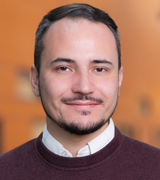Department of Mathematical and Industrial Engineering
Research interests and affiliations
- Socio-economic impact of infrastructure
- Infrastructure policy analysis
- Energy transition
- Energy policy
- Northern Canada
- Regional development
- Transportation in remote areas
- International Science Diplomacy Research Chair for Arctic and Space Cooperation, Co-investigator
- Institut nordique du Québec (INQ), Member
- Interuniversity Research Centre on Enterprise Networks, Logistics and Transportation (CIRRELT), Member
- Research Group on Globalisation and Management of Technology (GMT), Member
- 1003 Transportation engineering
- 2303 Other sources of energy (solar, wind, etc.)
- 8000 SOCIAL SCIENCES AND HUMANITIES
Publications
Biography
Prof. Thomas Stringer is an engineer and Assistant Professor of Industrial Engineering at Polytechnique Montréal. He specializes in the economic and sustainability aspects of infrastructure, including energy and transportation, with a particular focus on the societal impact of technologies in remote communities. His research bridges the fields of engineering and social sciences, emphasizing climate resilience and sustainable development in remote, northern communities, as well as in the Global South. Prof. Stringer earned his PhD in industrial engineering from Polytechnique Montréal and completed his postdoctoral training at the University of British Columbia. He holds an MBA from Université Laval and a bachelor’s degree in operations and logistics engineering from École de technologie supérieure (ÉTS). Prior to working at Polytechnique Montréal, Prof. Stringer worked at Tecnológico de Monterrey in the Department of Industrial Engineering, in Mexico.
Teaching
IND1401 : Sustainable production systems
Education
- B. Eng., Operations and Logistics Engineering (École de technologie supérieure (ÉTS))
- MBA (Université Laval)
- PhD, Industrial Engineering (Polytechnique Montréal)
- Postdoctoral fellowship, Civil Engineering (University of British Columbia)
Press review about Thomas Stringer




